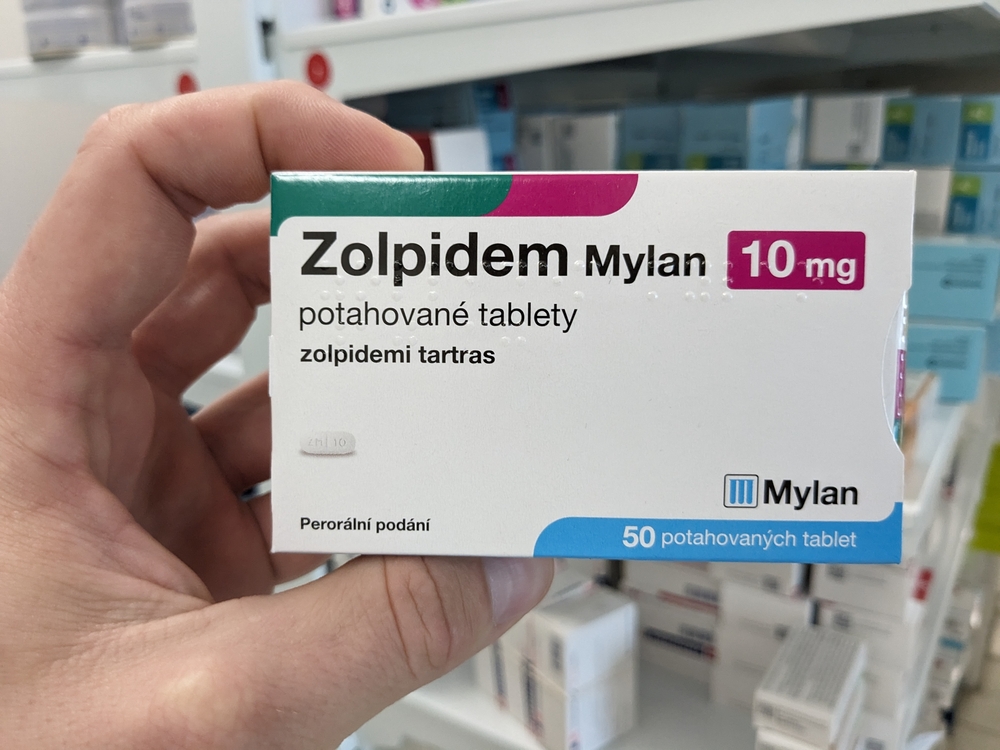Last Updated:
May 16th, 2025
Zolpidem Addiction | Symptoms, Effects and Causes
In the UK, about 20% of people struggle to get enough quality sleep but zolpidem can be a lifeline for those most desperate for rest. However, while zolpidem is one of the UK’s most prescribed sleeping pills, its potential for addiction looms large. This risk turns what can seem like the perfect sleep solution into a significant and even life-threatening problem. Being aware of zolpidem addiction signs and symptoms can prompt timely help and encourage the use of safer alternatives for managing insomnia.

What is zolpidem?
Known commercially as Ambien, zolpidem is part of a category of sleep medications called “Z-drugs”. Launched in the 1990s as a less addictive alternative to older benzodiazepines, zolpidem has now become a go-to medicine for many people dealing with sleep issues. It works by balancing the brain’s sleep signals, making it easier to drift off to sleep and stopping you from waking up during the night.
Zolpidem is typically prescribed for short-term use by doctors to help people who have just started having unexpected sleep problems. It is often used in hospitals too, to help patients sleep better if they are dealing with stress, anxiety or pain.
Despite its benefits, some of the most common zolpidem side effects include:
- Drowsiness
- Dizziness
- Headaches
- Nausea
- Memory problems
- Unusual behaviour like sleepwalking or driving or eating in a daze
- Hallucinations
- Coordination problems
What is zolpidem addiction?
Addiction to zolpidem sleeping tablets can develop when you become so reliant on the medication that it feels impossible to manage daily life without it. Zolpidem addiction often starts when you use it as a solution for genuine sleep issues but as usage continues and begins to escalate, a sleeping pill addiction can develop.
This can bind you physically (where your body demands the drug and you get sick without zolpidem) and psychologically (where your mental well-being feels tethered to its effects). When zolpidem takes hold of both your body and mind, controlling its use becomes increasingly difficult. Even with the awareness of the harm it’s causing, quitting can feel impossible with powerful zolpidem cravings and fear of withdrawal symptoms keeping you locked in a cycle of continuous use.
The signs and symptoms of zolpidem addiction
It is crucial to recognise the symptoms of zolpidem addiction early, even though this can be challenging when you are using it for legitimate sleep issues. Watch out for these key signs:
- Needing more zolpidem than before to get to sleep.
- Finding that you’re always running out early.
- Taking zolpidem during the day or feeling off-balance or moody when you don’t have it.
- Experiencing memory issues or blackout periods.
- Your school work or job performance deteriorating because you can’t concentrate.
- Avoiding telling people how much zolpidem you are using.
- Getting more zolpidem from illegal sources when you run out of your prescription.
- Continuing to take zolpidem despite knowing it’s bad for you.
If any of this sounds like you, it may be a good idea to seek help for zolpidem addiction.
What causes zolpidem addiction?
Zolpidem changes the chemicals in your brain which helps you relax and feel good. These effects mean that many people become tempted to keep using it beyond their prescription. However, a full zolpidem addiction is often due to other issues such as:
- Dealing with stress: Zolpidem might seem like a good quick fix if you are feeling stressed or anxious, leading you to use it not just for sleep but as an escape.
- Mental health shortcuts: If you are feeling depressed, zolpidem might seem like it helps at first but using it to fix these feelings can backfire and turn into a habit.
- Constant insomnia: When you can’t sleep regularly, you might start to rely on zolpidem too much, which can lead to needing it just to feel normal.
- Easy availability: When zolpidem is just a prescription away, or someone you know has easy access, it is hard to say no, even when you know you should.
- Family habits: If addiction runs in your family, you might be more open to it yourself without even realising it.
- Your friends and environment: If it’s normal in your circle to use zolpidem or other drugs, you might end up using zolpidem more often, too.
- Missing the fine print: If you don’t fully understand how addictive Zolpidem can be, you might end up using it irresponsibly and run into trouble.

What does zolpidem do to your health?
Zolpidem addiction can severely affect both your body and mind. The consequences can cause lasting damage with some of the most serious including:
How to overcome zolpidem addiction
The first crucial step in recovering from zolpidem addiction is entering a prescription drug detox programme. Here, medical experts oversee a gradual decrease in your zolpidem dosage, a strategy that helps prevent the body’s harsh reaction to sudden withdrawal. This slow and steady approach is often supplemented with additional medications tailored to relieve withdrawal symptoms and stabilise your condition.
Once detox is behind you and your physical dependency on zolpidem is managed, the journey continues with a deeper investigation into the causes of your addiction. This critical phase occurs in prescription drug rehab where you can select from private options or free NHS services. Inpatient rehab is frequently favoured for its effectiveness as it provides comprehensive care and a distraction-free setting that is conducive to healing.
Where to get help for zolpidem addiction
Battling an addiction to zolpidem can feel overwhelming, but with Addiction Helper, you start your recovery journey with confidence. Contact us today to begin exploring your treatment possibilities and take the first crucial step toward reclaiming your health.
Our compassionate team are ready and available to take your call, and guide you towards lasting the lasting addiction recovery you deserve.
Frequently Asked Questions
(Click here to see works cited)
- Moshfeghinia, Reza et al. “Severe chronic abuse of zolpidem for over 10 years: a case report and review of similar cases.” Frontiers in psychiatry vol. 14 1252397. 27 Sep. 2023, doi:10.3389/fpsyt.2023.1252397. Accessed 27 January 2025.
- Heydari, Mostafa, and Mohsen Saberi Isfeedvajani. “Zolpidem dependence, abuse and withdrawal: A case report.” Journal of research in medical sciences : the official journal of Isfahan University of Medical Sciences vol. 18,11 (2013): 1006-7. Accessed 27 January 2025.
- UK Addiction Treatment Centres. “Zolpidem Addiction | Zolpidem Abuse Signs and Symptoms | UKAT.” UK Addiction Treatment Centres, 3 January 2024, https://www.ukat.co.uk/addiction/drug/prescription/sleeping-pills/zolpidem/. Accessed 27 January 2025.
- UK Rehab. “Sleeping Pills | Causes, Symptoms and Diagnosis.” UK Rehab, https://www.uk-rehab.com/prescription-drug-addiction/sleeping-pills/. Accessed 27 January 2025.
- UK Rehab. “Zolpidem Addiction | Causes, Symptoms and Diagnosis.” UK Rehab, https://www.uk-rehab.com/prescription-drug-addiction/sleeping-pills/zolpidem/. Accessed 27 January 2025.

